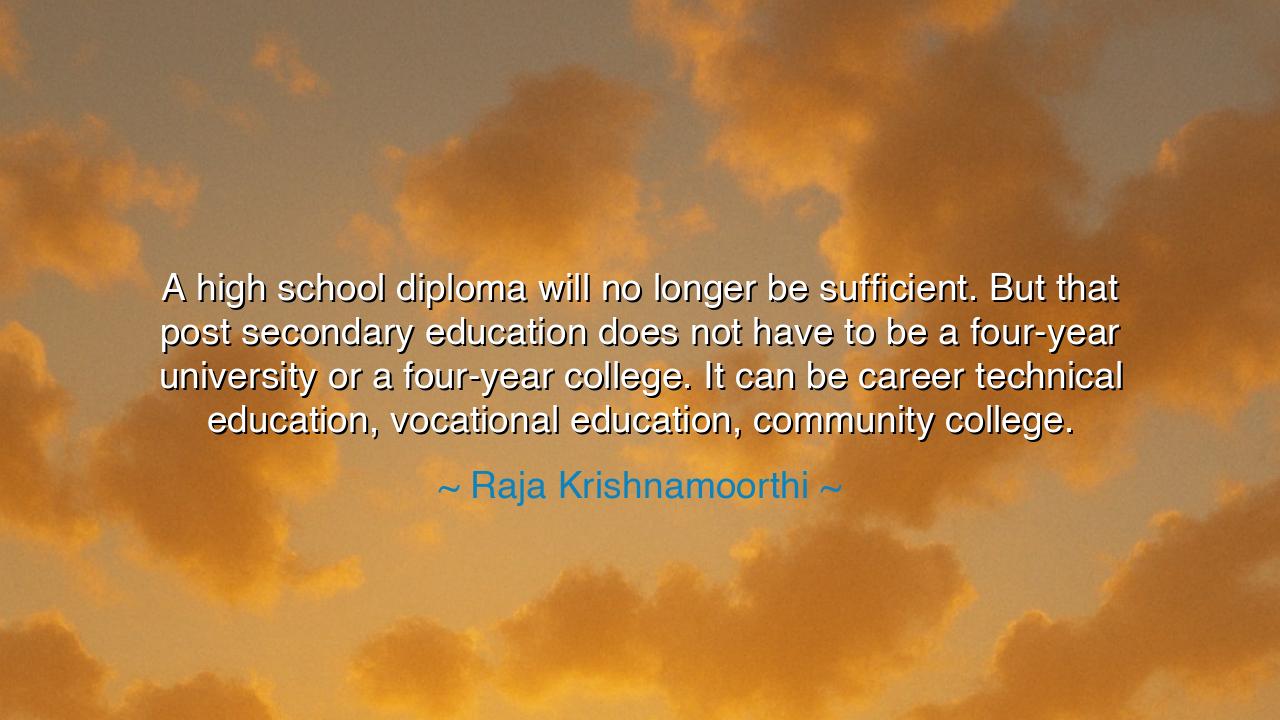
A high school diploma will no longer be sufficient. But that post
A high school diploma will no longer be sufficient. But that post secondary education does not have to be a four-year university or a four-year college. It can be career technical education, vocational education, community college.






The modern statesman Raja Krishnamoorthi, a voice of reason in an age of transformation, once proclaimed: “A high school diploma will no longer be sufficient. But that post-secondary education does not have to be a four-year university or a four-year college. It can be career technical education, vocational education, community college.” In these words lies a profound truth about the changing rhythm of the modern world. He speaks not as a dreamer of the past, but as a prophet of the future—a future where knowledge has become the new currency, and where the power to shape one’s destiny lies not in titles, but in skills, discipline, and the continuous pursuit of learning.
To understand this truth, we must first understand the age in which it was spoken. Krishnamoorthi, a leader who has long worked to strengthen America’s workforce and expand educational opportunities, looks upon a world reshaped by technology, automation, and globalization. The factories of steel and smoke have given way to industries of data and innovation. The tools of the craftsman have become the algorithms of the engineer, the circuits of the technician, the designs of the creator. In this new era, the high school diploma, once the golden key to opportunity, no longer opens the same doors. The world demands more—not necessarily more years, but more depth, more adaptability, and more mastery.
His wisdom carries both urgency and compassion. For Krishnamoorthi does not say that every young person must chase the halls of elite universities. Instead, he honors all paths of learning, declaring that education wears many forms. A student of the trades, learning the art of machinery or electricity, is as noble as the scholar of literature or law. A young person who studies welding, nursing, or computer repair builds the nation’s strength as surely as one who studies philosophy or medicine. The worth of a person’s education, he reminds us, is not measured in prestige, but in purpose. Vocational education, technical training, and community colleges are not lesser roads—they are vital arteries of civilization itself, feeding the heart of every nation.
History bears witness to this truth. Consider the story of Booker T. Washington, who rose from the chains of slavery to found the Tuskegee Institute, a school dedicated not to abstract theory but to practical education—the education of the hands and the heart. He taught young men and women the dignity of labor, the holiness of craftsmanship, and the power of skill as a form of freedom. His students became builders, inventors, and leaders, proving that education, when rooted in usefulness, can raise even the most oppressed to greatness. Like Krishnamoorthi, Washington understood that the world is built not only by thinkers but by doers, and that the union of the two creates progress that endures.
Yet Krishnamoorthi’s message is not merely about employment—it is about the dignity of work and the evolving soul of education itself. He reminds us that knowledge is not static; it must grow as the world grows. The farmer once learned to till the land by hand—today, he must master technology that maps the earth from satellites above. The nurse once carried a lamp through darkened wards—today, she must learn the language of machines that monitor the rhythm of life. The modern craftsman must be both worker and student, both artist and technologist. Thus, education can no longer end at the schoolhouse gate; it must become a lifelong journey, carried with humility and hunger for truth.
There is also a moral power in his words—a defense of equality and opportunity. Too long has society divided education into “high” and “low,” favoring universities over the trades, theory over practice. Krishnamoorthi tears down that false wall. He declares that every form of learning, when pursued with excellence and purpose, is sacred. The welder’s torch and the surgeon’s scalpel both demand mastery; the builder’s calloused hands and the engineer’s delicate calculations both shape the future. To honor only one path is to cripple the other. The world, he insists, needs both minds and hands—both scholars and artisans—to thrive.
The lesson we draw from his words is timeless: Education must serve life, and life must honor all who seek to learn. Let no young person believe their worth ends with a diploma, nor that wisdom dwells only in universities. Let every school, every community college, every training center become a temple of growth. Let governments invest not merely in degrees, but in people—people who learn, who adapt, who build, who create. And let parents, teachers, and leaders remind each child that education is not about prestige—it is about power: the power to think, to act, and to uplift.
So remember the words of Raja Krishnamoorthi, and carry them as a torch for the generations to come: “A high school diploma will no longer be sufficient.” This is not a lament—it is a call to rise. Rise beyond the limits of yesterday’s learning. Seek knowledge not for its name, but for its use. Whether you walk into a university, a workshop, or a community college, walk in with reverence, for every place that teaches truth is sacred ground. For when education expands beyond walls and titles—when it becomes the lifelong quest of the human soul—then society itself ascends, and the world, as Krishnamoorthi envisioned, becomes a place where every hand and every mind finds its rightful place in the grand work of creation.






AAdministratorAdministrator
Welcome, honored guests. Please leave a comment, we will respond soon